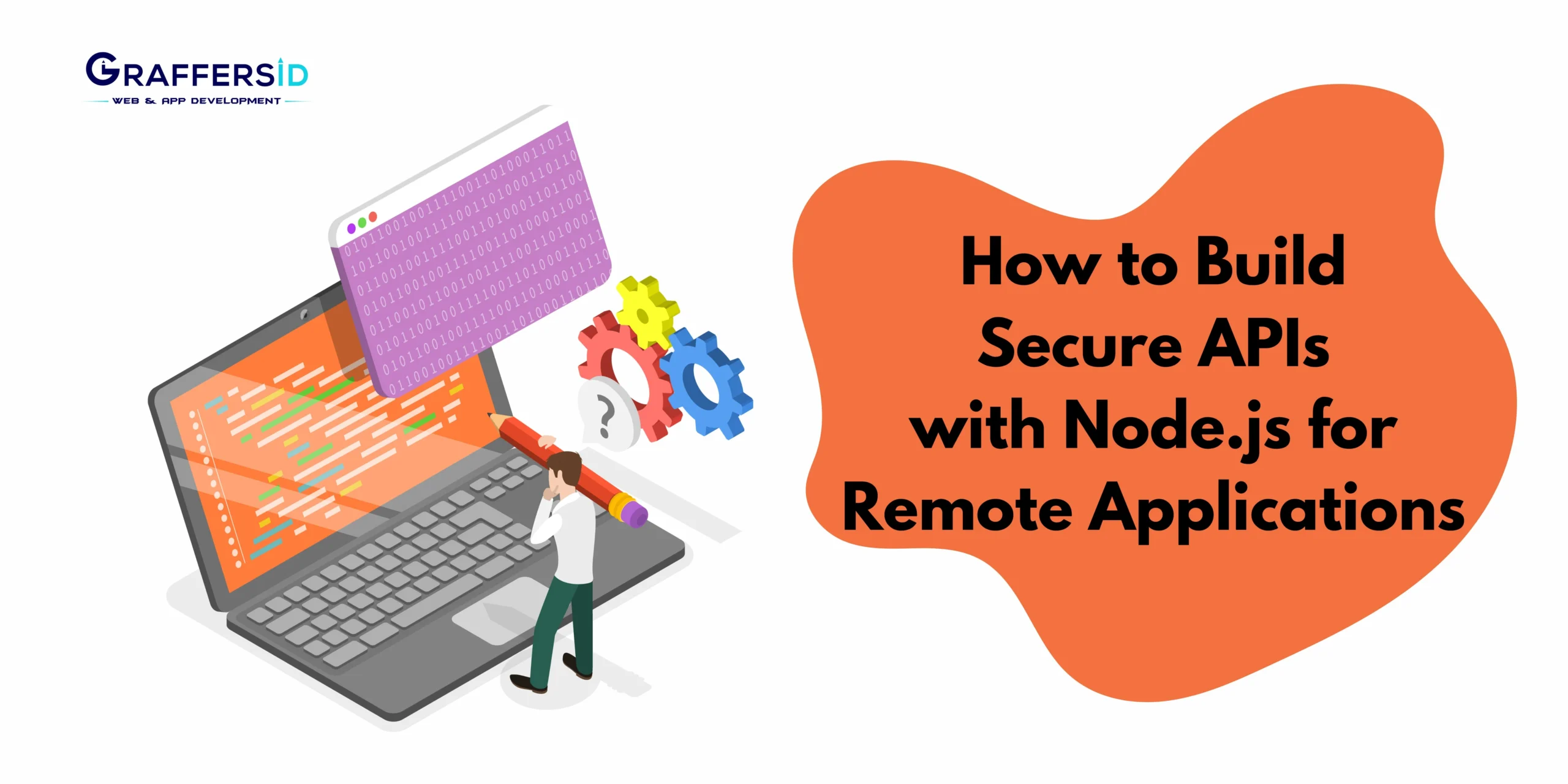Modern applications rely heavily on APIs, particularly in distributed and remote environments. Node.js’s popularity has given developers access to a strong and effective runtime environment for creating APIs. In this blog, we will discuss the best practices and necessary tools for creating scalable and secure APIs with Node.js for remote applications.
Benefits of Node.js API Development
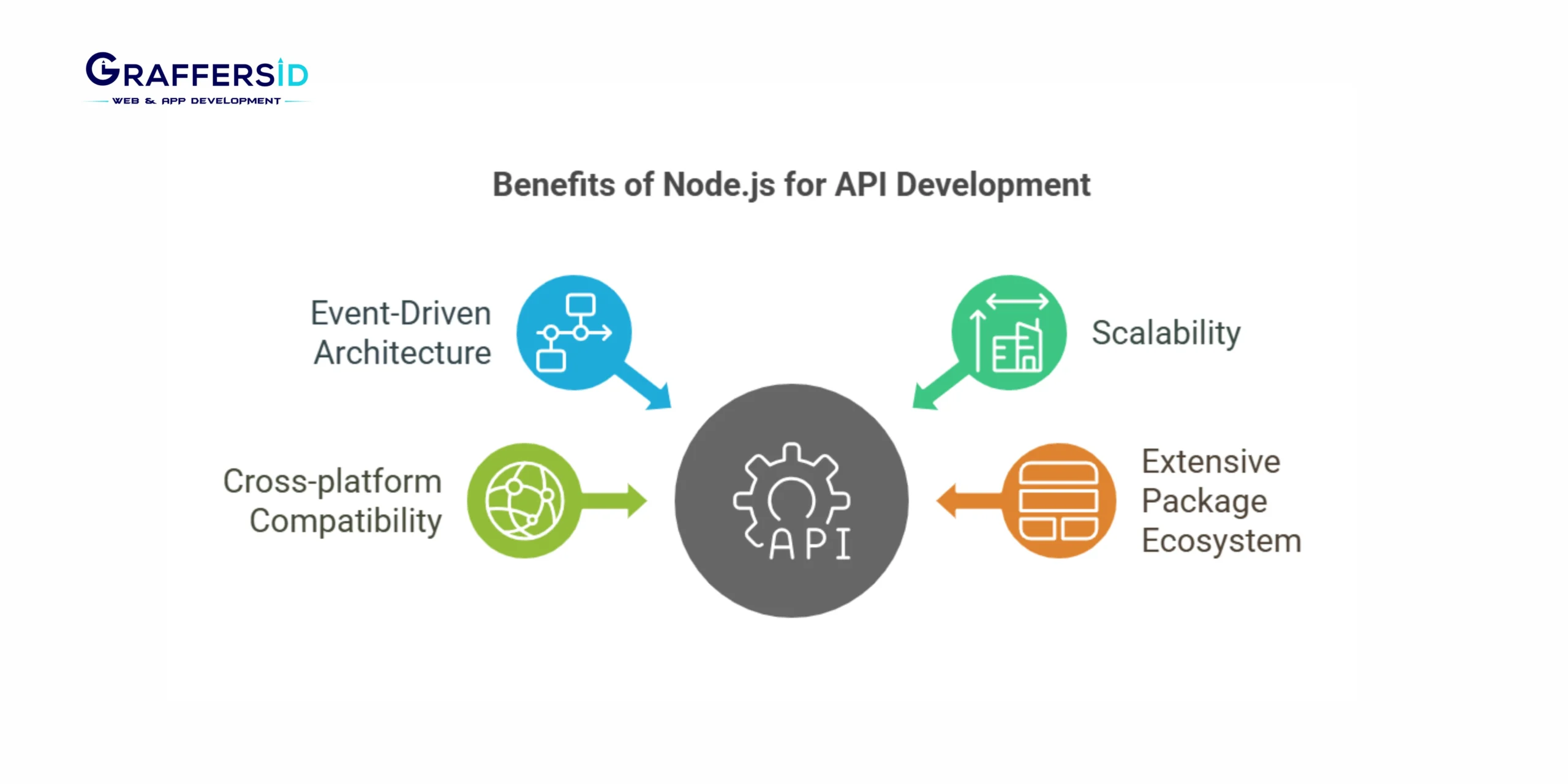
By providing a quick and expandable platform for creating online and mobile applications, Node.js has revised API development. Following are some benefits of using Node.js for API development:
1. Event-Driven Architecture:
Node.js processes multiple requests simultaneously, making it ideal for applications that require real-time interactions, such as messaging apps, live-streaming platforms, and online multiplayer games. Because of its effectiveness, users are guaranteed to receive updates instantly.
2. Scalability:
Node.js allows applications to grow easily by allowing additional resources to be added easily. Whether you’re running a small startup or a large-scale business, Node.js ensures your platform can handle increased traffic without disruptions.
3. Cross-platform Compatibility:
APIs built with Node.js work smoothly across devices and operating systems. This flexibility ensures that users, regardless of the platform they use, have a consistent experience.
4. Extensive Package Ecosystem:
Developers may use thousands of pre-built tools and packages with npm. This allows teams to focus on building unique features instead of designing an entire design, saving time and development efforts.
The benefits of Node.js make it a perfect choice for building efficient and expandable APIs that serve changing user needs. Using our Node.js development services, we help businesses create secure API systems that are suited to their needs.
Designing Scalable APIs with Node.js
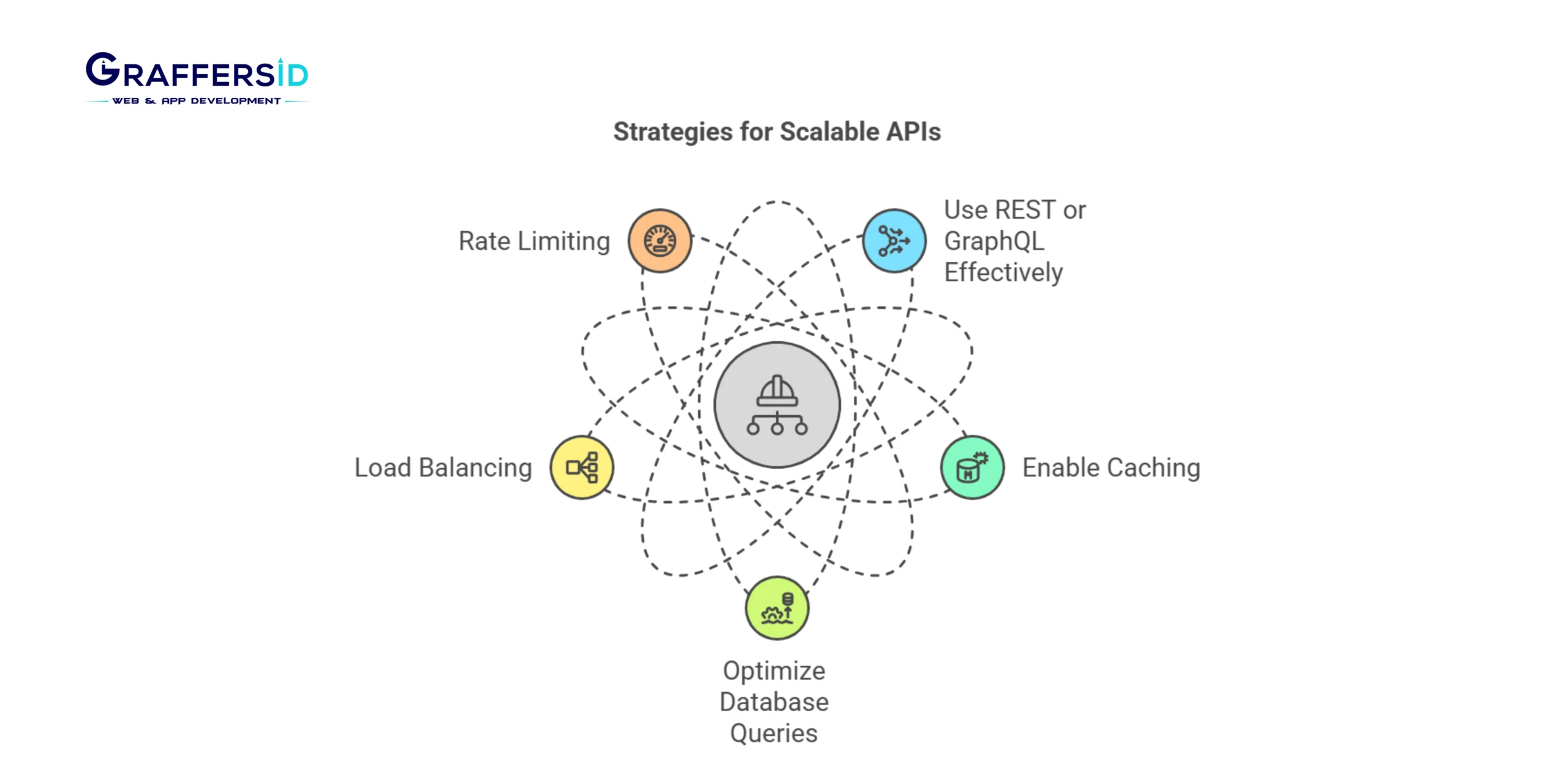
Scalability is critical for remote applications to maintain consistent performance, especially as the user base grows. The following strategies help design scalable APIs with Node.js:
1. Use REST or GraphQL Effectively:
REST APIs are simple and efficient means to get resources such as user profiles or products. GraphQL, on the other hand, is ideal for situations in which clients require specialized data, hence avoiding unnecessary information exchange. Which option is best depends on the requirements of your project.
2. Enable Caching:
Storing frequently accessed data locally allows users to access it more quickly. Caching user data or repeated search results reduces the need for a database and enhances response times.
3. Optimize Database Queries:
Databases with poor design might cause an application to lag. Effective data organization, key field indexing, and minimizing duplicate queries all help ensure speedy data access.
Read More: Why Hiring Node.js Developers is Key to Building Scalable Web Apps
4. Load Balancing:
Distributing incoming traffic across multiple servers prevents overloading any single server. This strategy ensures a smooth user experience even during peak traffic.
5. Rate Limiting:
Limiting the number of requests that a client or user may submit in a given period guards against server misuse and ensures that resources are allocated evenly to all users.
Proper planning and design are important when developing APIs to allow future growth while maintaining performance. Our Node.js web development team ensures that your APIs are created with expansion as well as efficiency in mind, using the most effective methods for handling heavy traffic loads.
Securing Node.js APIs for Remote Applications
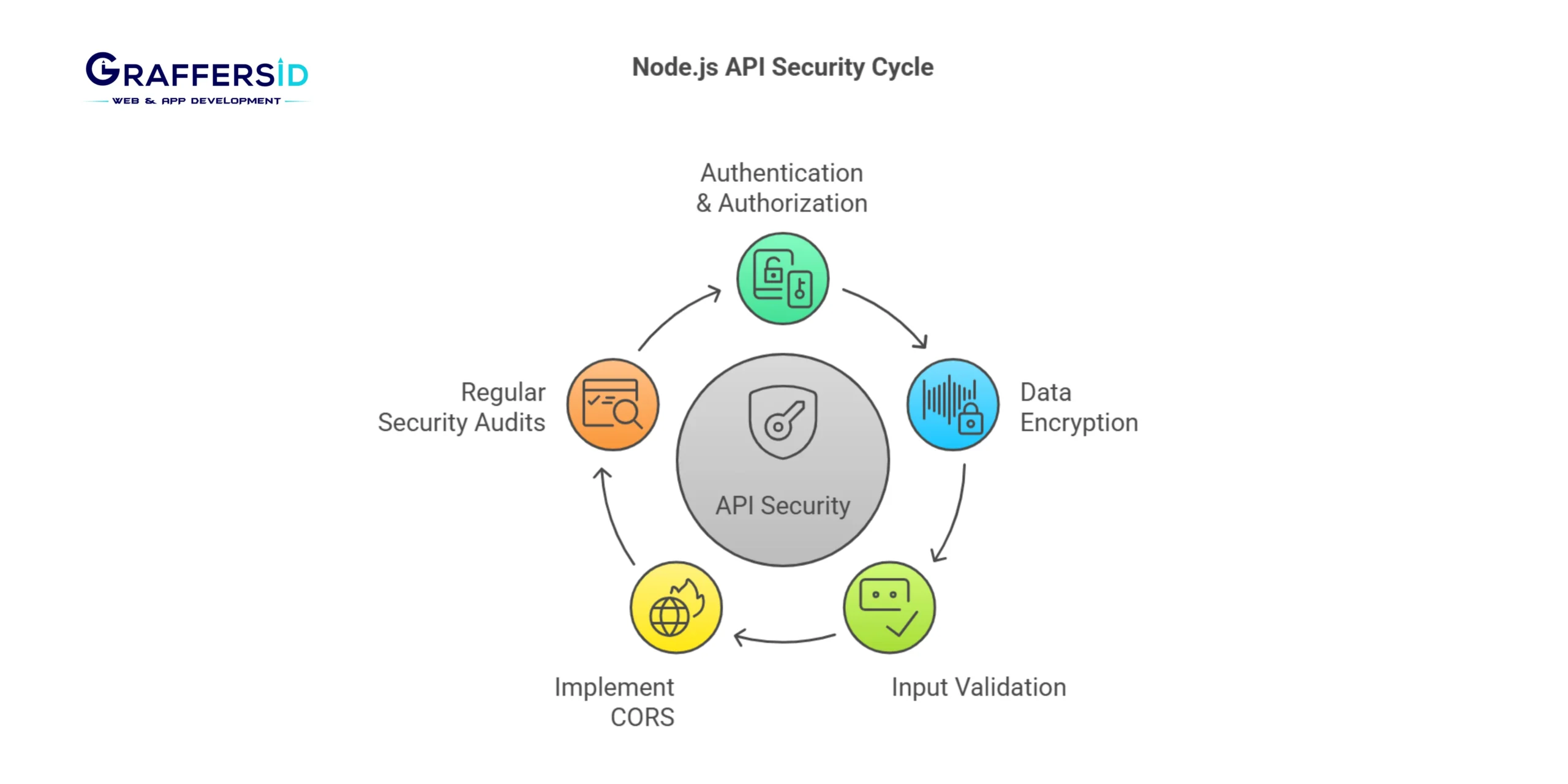
Security is important when developing APIs, especially for remote applications that often transfer private data. Follow these practices to secure your Node.js APIs:
1. Authentication and Authorization:
Verify user identities with secure methods like tokens or OAuth. Also, ensure that users only access data that they are authorized to use. These standards safeguard private information from illegal access.
2. Data Encryption:
Encryption is employed to help safeguard data during transmission against hackers, even if a data set is intercepted. Encryption opposes hackers’ access to personal information, financial information, and passwords.
3. Input Validation:
Always validate user input to block harmful code or malicious commands. For example, restrict the length of input fields and filter out potentially harmful characters.
4. Implement CORS:
Control which external websites or applications can interact with your API. This adds an extra layer of protection by limiting unwanted access.
5. Regular Security Audits:
Periodically review your API’s security measures to identify and fix vulnerabilities. Staying proactive helps protect your application against emerging threats.
It is essential to include strong security features in your Node.js APIs to ensure the security of remote applications. We specialize in delivering secure Node.js API development solutions. Our team makes sure your APIs are safe from potential attacks by implementing strong authentication protocols and carrying out thorough security audits.
Testing and Debugging Remote Node.js APIs
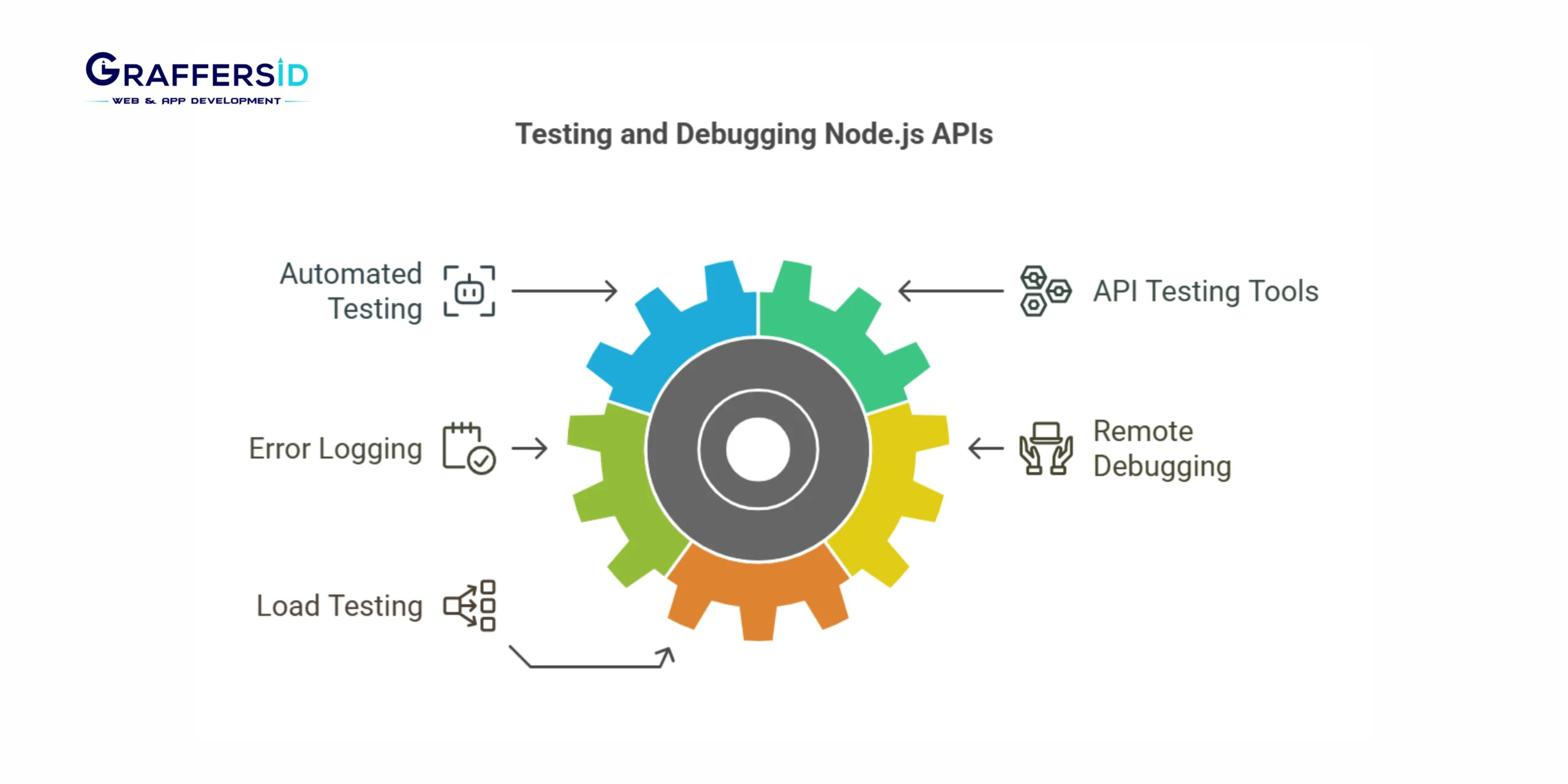
Testing and debugging are important when developing APIs. Here are some key steps to test and debug Node.js APIs:
1. Automated Testing:
Automated testing utilities enable developers to execute large numbers of code tests during brief intervals. Through automated testing, organizations receive accelerated operations and lowered human labor requirements.
2. API Testing Tools:
API endpoints require testing through user request simulations that analyze results by using Postman or Insomnia platforms. The testing platforms simplify the process of identifying errors or issues.
3. Error Logging:
Logging errors speeds up the identification and resolution of issues by providing comprehensive details about what went wrong. By reviewing logs, developers can identify problems and apply fixes more quickly.
4. Remote Debugging:
The debugging tool helps developers find issues, even when the application is running on a remote server. It saves time as well as ensures the application is running properly.
5. Load Testing:
Simulate high-volume traffic to test how well your API handles demand. Finding performance issues under load helps make quick improvements.
Testing and debugging help ensure that your Node.js APIs remain dependable and efficient, even in challenging conditions. Our developers focus on rigid testing and debugging methods to ensure effective API performance.
Integrating Node.js APIs with Frontend Technologies
A smooth user experience relies on the seamless integration of APIs with front-end technologies. Node.js APIs can be effectively combined with popular frontend frameworks such as React, Angular, or Vue.js. Here’s how to do it:
1. Choose the Right Frontend Framework:
Select a framework based on your project needs:
- React is best for building engaging and flexible user interfaces.
- Angular performs effectively for large-scale applications with complex features.
- Vue.js is compact and simple to learn, making it ideal for small projects.
2. Use REST or GraphQL:
- Either use REST for simple data exchange or GraphQL for more flexible and concrete data requests.
3. Synchronize Data:
- Efficiently controlling data flow between the front-end and back-end ensures smooth sync.
4. WebSocket Integration:
- WebSockets offer real-time data updates, which improve user experience.
5. Show Clear Error Messages:
- Providing user-friendly error messages makes applications more reliable and easier to use.
GraffersID provides complete solutions for integrating Node.js APIs with frontend technologies. Our expertise provides a smooth API integration that boosts performance and improves user experience.
Conclusion
Creating remote application-based secure APIs requires a strategic approach that can be expanded, ensures security, and integrates very well. Thus, by leveraging Node.js, implementing best practices, and putting emphasis on thorough testing, APIs can be built that suit remote users.
If you need experts in Node.js API development, GraffersID is here to help. We cover everything from scalable designs to secure deployments. Contact us today to hire Node.js developers and take your API platform to the next level.
